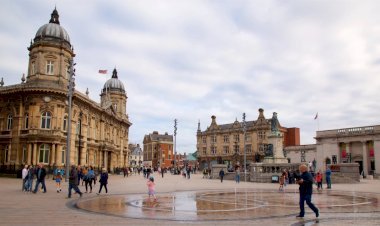How to Buy a House in Manchester (2025 Step-by-Step Guide)
Learn how to buy a house in Manchester in 2025. Step-by-step guide for first-time buyers covering mortgages, surveys, conveyancing, and local tips.

Buying a house in Manchester is an exciting milestone — and for many, it’s the start of a new chapter in one of the UK’s most vibrant cities. With a mix of modern apartments, historic terraces, and fast-developing suburbs, Manchester offers an impressive range of options for home buyers.
But if you’re stepping onto the property ladder for the first time, understanding the full process — from budgeting to legal paperwork — can feel overwhelming. This 2025 guide explains how to buy a house in Manchester step by step, with up-to-date information, real figures, and useful insights to help you make smart decisions.
Understanding the Manchester Property Market in 2025

Image source: Pinterest.com
The Manchester property market continues to be one of the most resilient and in-demand in the UK. According to Rightmove’s 2025 report, the average house price in Manchester is around £255,000, showing a steady year-on-year rise of about 2.3%.
Neighbourhoods such as Ancoats, Didsbury, Chorlton, and Salford Quays remain strong performers, attracting professionals, families, and investors alike. Meanwhile, regeneration projects in Victoria North, Ardwick Green, and Mayfield are reshaping Manchester’s skyline and creating new residential zones.
Manchester’s housing demand is supported by its economic growth, strong rental sector, and reputation as the UK’s “second city.” Major employers in tech, media, and finance continue to draw talent here, ensuring long-term stability for the housing market.
If you’re planning to buy in 2025, now is a favourable time. Mortgage rates have stabilised, more properties are entering the market, and average growth is expected to continue between 6–8% through 2026.
Setting Your Budget and Getting a Mortgage in Principle

Image source: Pinterest.com
Before house-hunting, you’ll need a clear understanding of your finances. In 2025, the average two-year fixed mortgage rate in the UK is about 4.8%, while five-year deals are around 4.4%, according to Moneyfacts.
Your first step is to check how much you can afford. Use an online mortgage calculator or consult a mortgage broker to estimate your borrowing power. Most lenders offer loans of up to 4.5 times your annual salary, though this depends on your credit score and deposit size.
If you’re a first-time buyer, you may qualify for schemes such as:
-
First Homes Scheme: discounted new-build homes for local buyers.
-
Shared Ownership: buy a portion of the home and pay rent on the rest.
-
Lifetime ISA: government bonuses to help with your deposit.
Once you have an estimate, request a Mortgage in Principle (MIP) from your lender. This shows sellers that you’re serious and financially prepared. Don’t forget to budget for extra costs like conveyancing fees, moving expenses, and surveys, which can add another 5–7% to your total purchase cost.
Choosing the Right Area to Live in Manchester

Image source: Pinterest.com
Manchester is a city of neighbourhoods — each with its own identity, community, and price range. Where you buy will depend on your lifestyle, budget, and long-term goals.
Popular Areas for Home Buyers in 2025

Image source: Pinterest.com
If you’re planning a long-term stay, look beyond the property itself — consider the neighbourhood’s safety, public transport, schools, and local amenities. Areas connected to Metrolink routes or near new regeneration zones often see faster value growth.
Starting the Property Search

Image source: Pinterest.com
Once your budget and preferred areas are decided, start exploring listings. Websites like Rightmove, Zoopla, and OnTheMarket are useful starting points, but it’s also wise to speak directly with local estate agents. Many properties are sold before they even appear online.
When viewing homes, visit at different times of the day. Check traffic noise, lighting, and parking availability. Ask the seller or agent about the property’s age, renovations, and the Energy Performance Certificate (EPC) rating.
While it’s tempting to rush into making an offer, patience is key. Viewing several properties helps you understand the local market better and avoid overpaying.
Arranging a Professional Property Survey

Image source: Pinterest.com
Once your offer is accepted, the next vital step is booking a home buyers survey. This inspection helps identify hidden issues such as damp, roof damage, subsidence, or plumbing problems — things that may not be visible during a viewing.
In a city like Manchester, where many homes are over 80 years old, a professional survey is not optional — it’s essential. Older brickwork, weather exposure, and past industrial land use can lead to costly structural issues.
There are two main types of surveys:
-
HomeBuyer Report – best for modern properties in reasonable condition.
-
Building Survey – more detailed; recommended for older or renovated homes.
Prices usually range between £400 and £700, depending on the size and complexity of the property.
Before completing your purchase, it’s smart to get an independent evaluation through a Manchester home buyers survey. This ensures you’re fully aware of the property’s condition and can negotiate repairs or a price reduction if necessary.
A survey provides peace of mind and could save you thousands in unexpected repairs down the line.
Making an Offer and Hiring a Conveyancer

Image source: Pinterest.com
When you’re confident about a property, make a formal offer through the estate agent. Research comparable homes nearby so your offer is realistic. In competitive areas like Ancoats or Chorlton, properties can receive multiple offers quickly, so being prepared helps.
Once your offer is accepted, hire a conveyancer or property solicitor. They’ll handle legal checks, local authority searches, title deeds, and contract reviews. Conveyancing in Manchester usually costs between £1,000 and £1,800 and takes around 8 to 12 weeks.
Your solicitor will also coordinate with the seller’s solicitor and your mortgage lender to ensure everything runs smoothly. Be responsive during this time — delays often happen due to missing paperwork or unanswered queries.
Exchanging Contracts and Completion

Image source: Pinterest.com
Once all legal work and surveys are done, both parties sign the contracts. This stage is called the exchange of contracts, and it’s legally binding. You’ll pay your deposit — usually 10% of the purchase price — and agree on a completion date.
The completion phase follows shortly after, when the remaining funds are transferred, and you officially become the property owner. Your solicitor will register your ownership with HM Land Registry and provide you with the legal documents.
From this moment, you’re free to move in, start decorating, and make the house truly yours.
Total Costs of Buying a House in Manchester

Image source: Pinterest.com
Many buyers underestimate how much extra they’ll spend beyond the property price. Along with your deposit, plan for the following:
Having an emergency fund or savings buffer is always wise, especially if unexpected repairs or furnishing costs arise after moving in.
Moving In and Getting Settled

Image source: Pinterest.com
Once completion is confirmed, your estate agent will hand you the keys. Take meter readings for gas, electricity, and water, and set up your utility accounts right away. Register for council tax with Manchester City Council and update your address with your employer, GP, and bank.
Before moving large items, check the property for small maintenance issues — leaking taps, faulty switches, or minor repairs are easier to handle before unpacking.
Moving into a new home in Manchester can be a special experience. Whether it’s the buzz of the city centre or the calm of suburban life, the city offers a strong sense of community, cultural diversity, and access to everything from football to fine dining.
Take time to explore your new area and make connections — Manchester’s friendliness is one of its greatest charms.
Common Mistakes to Avoid When Buying in Manchester

Image source: Pinterest.com
Buying a house is a big commitment, and first-time buyers often make similar mistakes. Avoiding these will save you stress and money.
-
Skipping a professional survey: A mortgage valuation isn’t a full inspection. Always get a proper survey.
-
Underestimating total costs: Legal fees, taxes, and small repairs can quickly add up.
-
Not checking local development plans: New construction nearby can impact noise, views, and future value.
-
Failing to act quickly: Manchester’s housing market moves fast — being slow to respond can mean missing out.
Being informed and proactive will make the process far smoother.
Read Also: How to Find the Perfect Small Business Space for Rent – 2025 Guide
Final Thoughts
Learning how to buy a house in Manchester takes time and research, but it’s one of the most rewarding investments you can make. With its strong economy, diverse property choices, and friendly communities, Manchester continues to be one of the UK’s most desirable cities to live in.
Start by setting your budget, exploring neighbourhoods, and speaking to local experts. Secure your mortgage early, and don’t skip essential steps like the home buyers survey and conveyancing checks.
With the right preparation, you’ll soon find yourself holding the keys to your new Manchester home — and beginning an exciting new chapter in one of Britain’s most thriving cities.
Frequently Asked Questions (FAQs)
1. How long does it take to buy a house in Manchester from start to finish?
The average home-buying process in Manchester takes around 10 to 14 weeks, depending on the complexity of the sale. This includes time for mortgage approval, conveyancing, and property searches. However, cash buyers or chain-free purchases can sometimes complete in as little as 6 to 8 weeks.
2. Is buying a house in Manchester cheaper than in London?
Yes, significantly. As of 2025, the average house price in Manchester is around £255,000, compared to £735,000 in London. That means Manchester properties cost roughly one-third of London prices, making it far more affordable for first-time buyers and investors.
3. What are the best months to buy a house in Manchester?
Spring (March–May) and autumn (September–November) are generally the best times to buy a house in Manchester. During these periods, there’s more housing stock available, and sellers tend to be more open to negotiation before year-end. Summer and winter months often have less competition but fewer listings.
4. Can foreigners or non-UK residents buy property in Manchester?
Yes, foreign nationals and non-UK residents can buy property in Manchester without restrictions. However, getting a UK mortgage may require a larger deposit (typically 25%–40%) and additional documentation. Many international buyers purchase through cash or specialist lenders that cater to overseas investors.
5. Are new-build homes in Manchester a good investment?
New-build homes, especially around Victoria North, Salford Quays, and Ancoats, can be a good investment due to high rental demand and modern energy standards. However, buyers should compare prices carefully — new builds often have a premium price tag compared to similar resale properties in the same area.
6. What is a gazumping, and can it happen in Manchester?
Gazumping happens when a seller accepts a higher offer from another buyer after already agreeing to your offer, but before contracts are exchanged. It’s legal but frustratingly common in competitive markets like Manchester. To avoid it, move quickly with your mortgage paperwork and keep regular communication with your solicitor.
7. Do I need home insurance before completing the purchase?
Yes. Most mortgage lenders require buildings insurance to be in place from the day you exchange contracts, not after completion. This ensures the property is covered for damage or loss while you’re legally bound to buy it. You can add contents insurance once you move in.
8. Are Manchester property prices expected to rise or fall in 2026?
Analysts predict a moderate rise of 5–8% in Manchester property values by 2026, driven by continued regeneration projects and strong employment growth. Areas such as Didsbury, Chorlton, and Salford Quays are expected to perform best due to location, transport links, and investment activity.




























